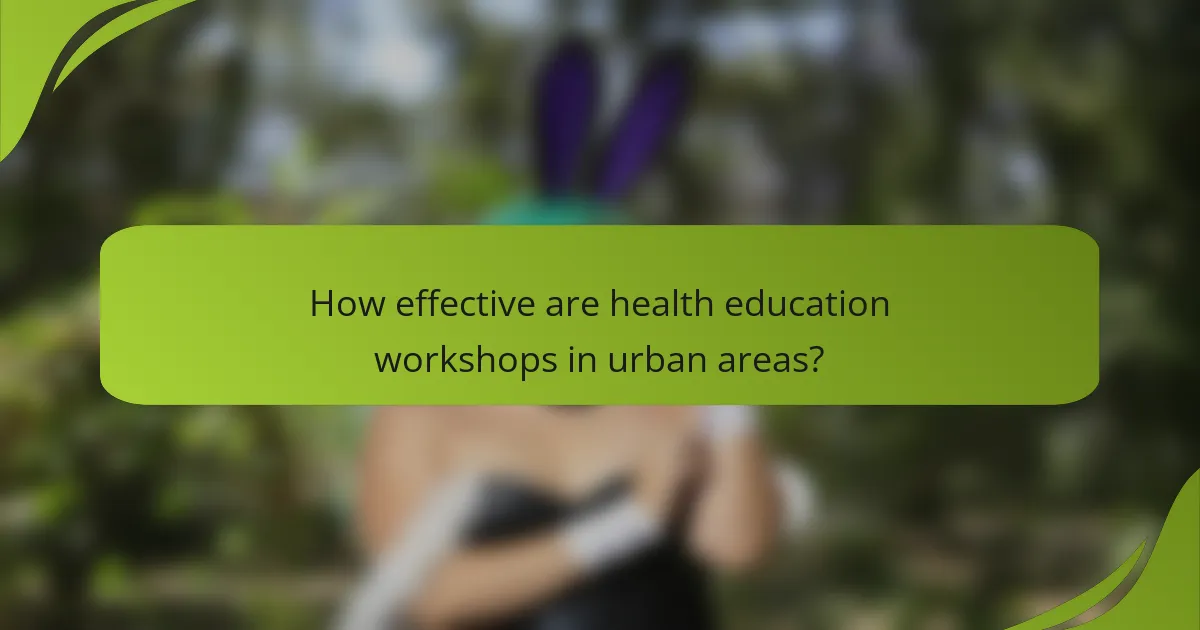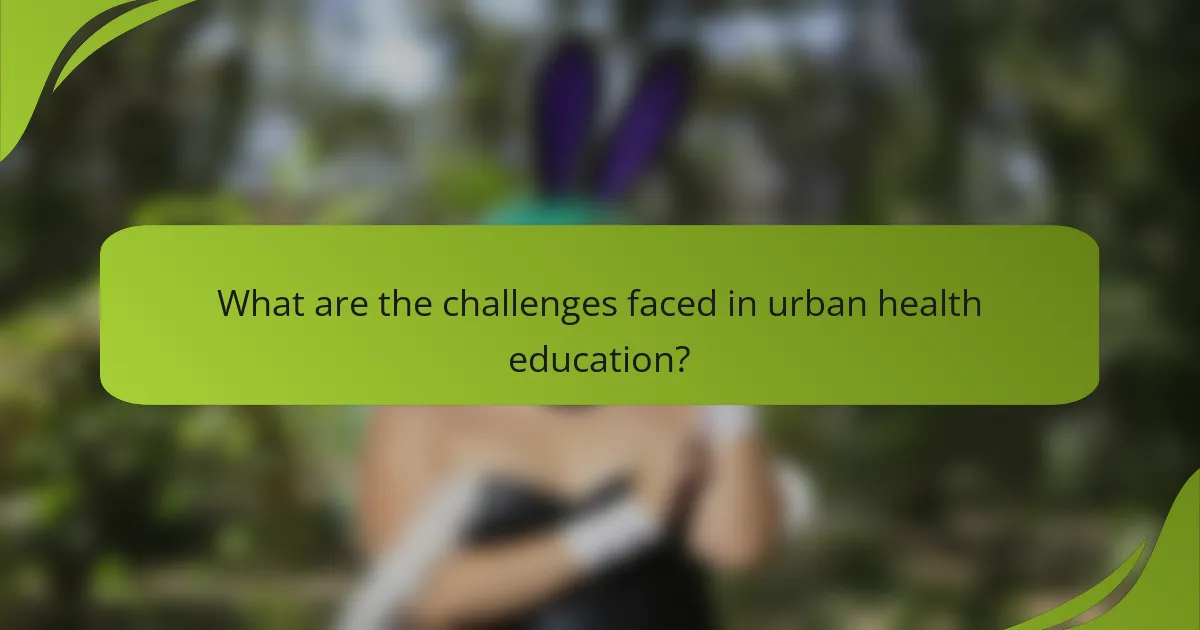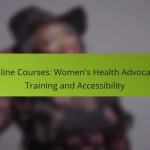Health education workshops in urban areas play a crucial role in improving community health outcomes by delivering targeted knowledge and skills. By focusing on topics such as nutrition, mental health, and chronic disease management, these workshops engage participants through interactive elements and relevant local case studies, fostering a healthier population.

How effective are health education workshops in urban areas?
Health education workshops in urban areas are highly effective in enhancing community health outcomes. They provide essential knowledge and skills, fostering a healthier population through targeted education and engagement strategies.
Improved health literacy
Health education workshops significantly boost health literacy among urban residents. Participants gain a better understanding of medical terms, health services, and preventive care, which empowers them to make informed health decisions.
For example, workshops that focus on nutrition can help individuals decipher food labels and understand dietary guidelines, leading to healthier eating habits. This improvement in health literacy often translates into better management of chronic conditions and overall well-being.
Increased community engagement
These workshops foster increased community engagement by bringing people together around common health issues. Participants often form support networks, which can lead to collaborative efforts in addressing local health challenges.
Engagement can be further enhanced by involving local leaders and organizations, creating a sense of ownership and responsibility towards community health initiatives. This collective approach not only strengthens social ties but also amplifies the impact of health education.
Behavioral change outcomes
Health education workshops are instrumental in driving behavioral change among urban populations. By providing practical strategies and resources, these workshops encourage participants to adopt healthier lifestyles.
For instance, workshops that include physical activity demonstrations or cooking classes can lead to increased exercise and better dietary choices. Tracking changes in behavior can be done through follow-up surveys, which often reveal significant improvements in health-related habits over time.

What types of health education workshops are most popular?
The most popular health education workshops typically focus on nutrition, mental health awareness, and chronic disease management. These workshops engage participants by providing practical knowledge and skills to improve their health outcomes.
Nutrition workshops
Nutrition workshops are designed to educate participants about healthy eating habits, meal planning, and understanding food labels. They often include interactive cooking demonstrations and discussions on dietary guidelines, making the information accessible and engaging.
Participants can learn about portion sizes, nutrient balance, and how to incorporate local foods into their diets. These workshops may also address specific dietary needs, such as vegetarianism or managing food allergies.
Mental health awareness sessions
Mental health awareness sessions aim to reduce stigma and promote understanding of mental health issues. These workshops often cover topics such as stress management, coping strategies, and the importance of seeking help when needed.
Activities may include group discussions, mindfulness exercises, and resources for local mental health services. Participants can gain valuable insights into recognizing signs of mental health challenges in themselves and others.
Chronic disease management programs
Chronic disease management programs focus on empowering individuals to manage conditions like diabetes, hypertension, and asthma. These workshops provide education on self-monitoring, medication adherence, and lifestyle modifications to improve health outcomes.
Participants often receive practical tools, such as tracking logs and action plans, to help them manage their conditions effectively. Engaging with healthcare professionals and peers in these sessions can foster a supportive community for ongoing health management.

How can urban health education workshops engage participants?
Urban health education workshops can effectively engage participants by incorporating interactive elements, using relevant local case studies, and integrating technology. These strategies help to create a more dynamic learning environment that resonates with the specific needs and experiences of urban communities.
Interactive activities
Interactive activities, such as group discussions, role-playing, and hands-on demonstrations, can significantly enhance participant engagement in health education workshops. These methods encourage active participation, allowing attendees to share their experiences and learn from one another.
Consider incorporating activities like health quizzes or scenario-based problem-solving sessions. These can help participants apply knowledge in real-world contexts, making the information more relatable and memorable.
Use of local case studies
Utilizing local case studies in health education workshops helps participants connect the material to their own community. By discussing real-life examples that reflect local health issues, attendees can better understand the relevance of the information presented.
For instance, workshops can analyze recent public health initiatives or local health statistics, allowing participants to see the direct impact of health education on their lives. This approach fosters a sense of ownership and responsibility towards community health.
Incorporating technology
Incorporating technology into health education workshops can enhance engagement and accessibility. Tools like mobile apps, online surveys, and interactive presentations can facilitate real-time feedback and participation.
For example, using a polling app during a workshop can allow participants to anonymously share their opinions on health topics, making discussions more inclusive. Additionally, providing access to online resources can help attendees continue their learning beyond the workshop setting.

What are the key components of successful workshops?
Successful health education workshops typically include qualified facilitators, targeted content, and accessible locations. These components ensure that participants receive relevant information in an engaging manner, making it easier for them to apply what they learn.
Qualified facilitators
Qualified facilitators are essential for delivering effective workshops. They should possess relevant expertise, experience in health education, and strong communication skills to engage participants. Facilitators who can relate to the audience’s background and challenges often enhance the learning experience.
When selecting facilitators, consider their credentials and previous workshop feedback. A good practice is to conduct interviews or review their teaching methods to ensure they align with the workshop’s goals.
Targeted content
Targeted content is crucial for addressing the specific needs and interests of the audience. Workshops should focus on relevant health topics, such as nutrition, mental health, or chronic disease management, tailored to the demographic and cultural context of participants.
To create effective content, conduct surveys or focus groups to identify the most pressing health concerns within the community. This approach helps ensure that the information provided is both practical and applicable, increasing participant engagement.
Accessible locations
Choosing accessible locations for workshops is vital to maximizing attendance and participation. Venues should be easy to reach via public transport and have adequate facilities for individuals with disabilities. Consider community centers, schools, or local health clinics as potential sites.
Additionally, offering workshops at various times, including evenings or weekends, can accommodate different schedules. This flexibility helps attract a broader audience and ensures that more individuals can benefit from the health education provided.

What are the challenges faced in urban health education?
Urban health education faces several challenges that can hinder its effectiveness, including limited resources, diverse audience needs, and logistical issues. Addressing these challenges is crucial for developing impactful health education programs in urban settings.
Resource limitations
Many urban health education initiatives struggle with inadequate funding and staffing. Limited budgets can restrict the availability of educational materials, technology, and trained personnel, making it difficult to reach the target audience effectively.
To mitigate resource limitations, organizations can seek partnerships with local businesses or non-profits for sponsorships and in-kind donations. Utilizing digital platforms for online workshops can also reduce costs associated with physical venues.
Diverse audience needs
Urban populations are often diverse, encompassing various cultural backgrounds, languages, and health literacy levels. This diversity necessitates tailored educational approaches to ensure that health messages resonate with all community members.
To address diverse audience needs, health educators should conduct community assessments to identify specific health concerns and preferences. Offering materials in multiple languages and using culturally relevant examples can enhance engagement and comprehension.
Logistical issues
Logistical challenges, such as transportation barriers and scheduling conflicts, can impede participation in health education workshops. Urban residents may have limited access to reliable transportation or may work non-traditional hours, making it difficult to attend events.
To overcome these logistical issues, consider offering workshops at various times and locations, including community centers and online formats. Providing transportation assistance or virtual options can significantly increase attendance and participation rates.

How can workshops be tailored for specific urban populations?
Workshops can be effectively tailored for specific urban populations by considering their unique needs, preferences, and challenges. This involves understanding the demographics, cultural backgrounds, and health concerns prevalent in those communities.
Language considerations
Language plays a crucial role in ensuring effective communication during health education workshops. Facilitators should assess the primary languages spoken within the urban population and provide materials and instruction in those languages. This may involve hiring bilingual staff or using translation services to enhance understanding.
Additionally, using simple, clear language and avoiding jargon can help participants grasp complex health concepts. Visual aids and demonstrations can further bridge language gaps, making the content more accessible.
Cultural relevance
Cultural relevance is essential for engaging urban populations in health workshops. Understanding cultural beliefs, practices, and values allows facilitators to tailor content that resonates with participants. This could involve incorporating local health practices or addressing specific health issues that are more prevalent in the community.
Facilitators should also consider the cultural context when designing activities and discussions. Engaging community leaders or representatives can help ensure that the workshops are respectful and relevant, fostering a sense of trust and participation among attendees.


